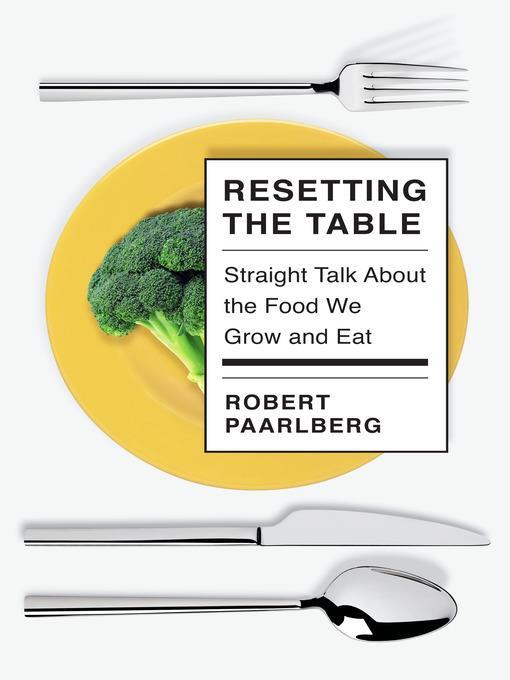
Resetting the Table
Straight Talk About the Food We Grow and Eat
کتاب های مرتبط
- اطلاعات
- نقد و بررسی
- دیدگاه کاربران
نقد و بررسی

August 10, 2020
Paarlberg (Starved for Science), a professor of public policy at Harvard’s Kennedy School, presents this astute look at food production in the U.S. Noting that food sources and producers—Big Ag, trans fats, GMOs, beef production, the sugar lobby, and farm subsidies—have been charged as contributors to the shortcomings of America’s food system, he redirects the blame, instead, to Big Food—a term for the powerful and persuasive industry that manufactures and markets what people consume. Citing multiple studies and case histories, Paarlberg rejects positions of popular voices on the subject, such as Michael Pollan and Mark Bittman, that organic farming and locavorism are the answers, although he is in favor of eating less red meat, and highlights modern practices such as precision agriculture and ecomodernism, which reduce waste of natural resources and limit environmental damage. For poor and wealthy Americans alike, Paarlberg says, having too much to eat is now a bigger health problem than having too little. But he leaves the reader with course corrections that seem reasonable. Big Food, faced with the one-two punch of evolving advances in modern farming and a more progressive push at promoting better eating, will, he hopes, respond in positive ways. Environmentally conscience readers will find much food for thought in this informative narrative.

August 15, 2020
A perceptive analysis of America's food system. Political scientist Paarlberg, who teaches public policy at Harvard's Kennedy School, levels a well-informed, evidence-based critique of a broad swath of players in food production and consumption: food companies (which process, package, transport, and advertise products), supermarkets, and restaurant chains, all of which have created "food swamps" of unhealthy choices; as well as "advocacy organizations fixated on local food and organic food" and "those who push for agroecology or food sovereignty over green revolution farming." He debunks food movement activists such as Michael Pollan, Mark Bittman, and Alice Waters, calling their advocacy of preindustrial agriculture elitist. A return to those farming methods, he writes, "can work on a small scale for those with plenty of money to spend, but it will never be a society-wide solution." Drawing on scientific and economic research, combined with visits to farms and food plants, Paarlberg asserts persuasively that "modern farming protects the environment not only by using less land compared to several decades ago; it also uses less water, less fossil energy, and fewer chemicals." Analyzing the use of pesticides, fertilizers, and GMOs, the author argues that much fear of these products is unsupported by research. "Visions that privilege what comes from nature over what is made by people have a mystical appeal," he writes, "but they malfunction as practical guidance." Paarlberg highlights many commercial farms that judiciously employ scientific methods in planting, harvesting, and raising livestock. Yet for many food activists, the idea of applying modern science to agriculture and food production has "become strangely controversial"--even though "compared to small farms and local marketing systems, bigger operations are better able to detect and avoid contamination." Paarlberg criticizes commercial farm organizations, too, for supporting food processing companies, and he calls for farmers to become strong advocates for healthful eating. A cogent, revealing look at the future of food.
COPYRIGHT(2020) Kirkus Reviews, ALL RIGHTS RESERVED.

Starred review from October 1, 2020
Wellesley College political-science professor and Harvard University researcher Paarlberg (The United States of Excess, 2015), who's had a career-long focus on agricultural policy, shares this broadly and deeply informed discussion of the life-and-death issues over how we grow, process, and consume our food. In particular, he cites the tension between noble efforts to build sustainability and safety into our food system against the overwhelming need to supply vast quantities of food to a hungry, ever-growing global population. Thoroughly discussed within this broader context are such issues as pesticide use; GMO and gene-edited foods; obesity and the role food manufacturers, restaurants, and grocery stores play in it; the encouraging practice of precision agriculture, which uses fewer resources while increasing production; and both the damage our meat consumption has on the environment and the resulting research to create affordable, edible, and sustainable meat substitutes. All in all, an almost indispensable guide to our food system?and how to make that system work better.(Reprinted with permission of Booklist, copyright 2020, American Library Association.)

December 1, 2020
Paarlberg (emeritus, political science, Wellesley Coll.) provides a clear-eyed look at the present and future of food production. Addressing the movements toward locally grown, organic, and "slow" food, he demonstrates that these will never be sufficiently scalable to meet world food demand. To grow the same amount of food that is produced now, under organic standards, would require bringing far more land into production, much of which would be environmentally sensitive. Industrial farmers today are growing more food on less land, thanks to improvements in precision application of fertilizers and water. Paarlberg places the blame for our current epidemic of obesity and diet-related health problems firmly on the shoulders of food manufacturing, grocery stores, and restaurants for their promotion of unhealthy food. He concludes that commercial farmers did not bring on the food crisis, but they can help to address it by breaking political ranks and siding with progressive attempts to improve dietary health. If farmers were to partner with public health organizations rather than food manufacturers to address food policy, he maintains, the U.S. would have a better chance of reaching our health-related goals. VERDICT A book that will be of interest to everyone who is concerned about the health effects of food. --Rachel Owens, Daytona State Coll. Lib., FL
Copyright 2020 Library Journal, LLC Used with permission.

























دیدگاه کاربران